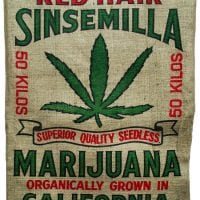CORRECTION
Our previous posting erroneously misinterpreted the scope of the Correa bill, SB 847, banning collectives within 600 feet of residential areas.
The bill applies ONLY to collectives that have a storefront or mobile location requiring a business license, e.g. a dispensary or delivery service. It does NOT apply to patients who privately share garden space with other patients in a non-commercial manner.
The relevant language which we overlooked is:
(e) This section shall apply only to a medical marijuana cooperative, collective, dispensary, operator, establishment, or provider that is authorized by law to possess, cultivate, or distribute medical marijuana and that has a storefront or mobile retail outlet which ordinarily requires a local business license
While SB 847 does not apply to non-commercial home collectives, it does seem to apply to satellite growers for dispensaries. Thus, collective members who grow for a storefront dispensary cannot grow within 600 feet of a residential area under the proposed bill. However, if they just grow privately with a friend or two, they are not affected.
– Dale Gieringer, Cal NORML
June 15 – A nasty bill restricting medical cannabis collectives to non-residential areas will be facing a key vote in the Assembly Health Committee next Tuesday, Jun 21.
The bill, SB 847 by Sen Lou Correa, would make it illegal for collectives to grow, distribute, or operate within 600 feet of a residential area. The upshot would be to criminalize thousands of small-scale collective gardeners who happen to be growing on their residential property.
The bill does allow the 600-foot rule to be suspended at local option, but this wrongly puts the burden on local governments to protect collective growers from the risk of felony sales charges.
Constituents are urged to tell the Assembly Health Committee to oppose SB 847. With California under court order to reduce its prison population, the last thing we need is more medical marijuana felons.
ASSEMBLY HEALTH COMMITTEE MEMBERS:
Bill Monning (D-Santa Cruz) 916-319-2027/ FAX 319:2127
Dan Logue (R-Chico) 916-319-2003
Tom Ammiano (D-SF) 916-319-2013
Toni Atkins (D-San Diego) 916-319-2076
Susan Bonilla (D-Martinez) 916-319-2011
Mike Eng (D-Monterey Park) 916-319-2049
Martin Garrick (R-Carlsbad) 916-319-2074
Richard Gordon (D-Redwood City) 916-319-2021
Mary Hayashi (D-Hayward) 916-319-2018
Roger Hernandez (D-Baldwin Park) 916-319-2057
Bonnie Lowenthal (D-Long Beach) 916-319-2054
Allan Mansoor (R-Costa Mesa) 916-319-2068
Holly Mitchell (D-LA) 916-319-2047
Brian Nestende (R-Palm Desert) 916-319-2064
Richard Pan (D-Sacto) 916-319-2005
V Manuel Perez (D-Cathederal City) 916-319-2080
Jim Silva (R-Huntington Beach) 916-319-2067
Cameron Smyth (R-Santa Clarita) 916-319-2038
Das Williams (D-Santa Barbara) 916-319-2035
(Below is California NORML letter to Assembly Health Committee Chair Bill Monning)
Dear Chairman Monning:
California NORML strongly opposes SB 847 (Correa) to criminalize the location of medical marijuana collectives within 600 feet of residential areas.
This bill would make felons of thousands of medical marijuana patients who currently use their private residences to grow for more than one person. Because many patients cannot grow on their own property and don’t have other convenient or affordable sources of medicine, they frequently share collective garden space with other patients who do.
In the vast majority of cases, the only legal way to do so is as a “collective” under the Medical Marijuana Program Act (SB 420). (The only exception is if the grower can qualify as a patient “caregiver” under Prop. 215, but this is uncommon under terms of the Supreme Court’s Mentch decision).
SB 847 will therefore have the effect of unwittingly felonizing thousands of patients who currently have small, legal collectives on their own private, residential property.
With California already under court order to reduce its prison population, it is scarcely in the public interest to create thousands of new felons. Neither, of course, is it in the health interest of patients.
Although SB 847 theoretically allows exceptions by local option, this is a cumbersome and time-consuming mechanism, which wrongly puts the burden of action on local governments to reduce our prison population.
The inevitable upshot of SB 847 will be to increase the number of medical marijuana felons and prisoners in California. We urge the Committee’s “No” vote to this ill-considered legislation.
Sincerely,
Dale Gieringer, Director, California NORML/ Co-sponsor, Prop 215

